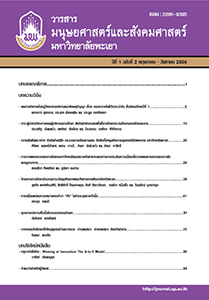อุดมการณ์ความเป็นอื่นในวรรณกรรมล้านนา
Keywords:
ความเป็นอื่น, อุดมการณ์, วรรณกรรมล้านนา, กลุ่มชาติพันธุ์, The Otherness, Ideology, Lanna Literary Works, Ethnic GroupAbstract
การศึกษาเรื่อง “อุดมการณ์ความเป็นอื่นในวรรณกรรมล้านนา” มีวัตถุประสงค์เพื่อศึกษาอุดมการณ์ในวรรณกรรมล้านนาที่มีต่อกลุ่มชาติพันธุ์ โดยศึกษาตามแนวคิดเรื่องการวิเคราะห์วาทกรรมแนวทฤษฎีวิพากษ์ (Critical Discourse Analysis : CDA) ของ นอร์แมน แฟร์เคลาฟ์ (Norman Fairclough) และแนวคิดเรื่องคู่ตรงข้าม (Binary Opposition) ของ โคลด เลวี่-เสตราส์ (Claude Lévi-Strauss)
ข้อมูลที่ใช้ในการวิจัยเป็นข้อมูลจากวรรณกรรมล้านนาที่เป็นวรรณกรรมมุขปาฐะ และวรรณกรรมลายลักษณ์ ได้แก่ นิทานขำขัน (เจี้ยก้อม) นิทานเกี่ยวกับผีในล้านนา สำนวนล้านนา และการเทศนาที่มีลักษณะขบขัน วรรณกรรมดังกล่าวมีผู้รวบรวมไว้แล้วจำนวน 163 เรื่อง
ผลการศึกษาพบว่าอุดมการณ์ในวรรณกรรมล้านนาที่มีต่อกลุ่มชาติพันธุ์มีจำนวน 4 อุดมการณ์ คือ 1) อุดมการณ์อำนาจนิยม 2) อุดมการณ์ความรุนแรง 3) อุดมการณ์ปิตาธิปไตย 4) อุดมการณ์รัฐชาติ
The Otherness Ideology in Lanna Literary Works
Vajrindra Kaencandra
School of Liberal Arts, University of Phayao
The research of the otherness ideology in Lanna literary works aims to study Lanna literary works ideology on the ethnic group. Two concepts have been applied to the research are Norman Fairclough’s Critical Discourse Analysis (CDA) theory and Claude Lévi-Strauss’s Binary Opposition theory.
The data was gathered from 163 stories collected from Lanna oral literature and literacy literature, namely humors tale, ghost tale, idiom, and sermon humors.
The finding of this research shows that there are four ideology on the ethnic group, namely 1) authoritarianism ideology, 2) violence ideology, 3) patriarchy ideology, and 4) nation ideology.
Downloads
How to Cite
Issue
Section
License
ผู้นิพนธ์ต้องรับผิดชอบข้อความในบทนิพนธ์ของตน มหาวิทยาลัยพะเยาไม่จำเป็นต้องเห็นด้วยกับบทความที่ตีพิมพ์เสมอไป ผู้สนใจสามารถคัดลอก และนำไปใช้ได้ แต่จะต้องขออนุมัติเจ้าของ และได้รับการอนุมัติเป็นลายลักษณ์อักษรก่อน พร้อมกับมีการอ้างอิงและกล่าวคำขอบคุณให้ถูกต้องด้วย
The authors are themselves responsible for their contents. Signed articles may not always reflect the opinion of University of Phayao. The articles can be reproduced and reprinted, provided that permission is given by the authors and acknowledgement must be given.








